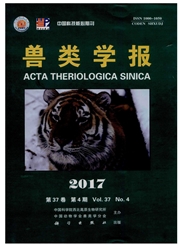

 中文摘要:
中文摘要:
为探讨大麝鼩(Crocidura lasiura)的生理生态适应特征,对其体温调节和能量代谢进行了测定。结果表明:在环境温度为17.5~27.5℃的范围内,大麝鼩的体温基本维持恒定,平均体温为(36.40±0.05)℃;热中性区为20~30℃;基础代谢率为(4.37±0.14)ml O2/(g.h);最小热传导为(0.32±0.01)ml O2/(g.h.℃)。大麝鼩的摄入能为(4.40±0.43)kJ/(g.d),消化能为(4.03±0.40)kJ/(g.d),可代谢能为(3.95±0.39)kJ/(g.d)。消化率为(91.41±0.88)%,可代谢能效率为(89.58±0.87)%。总之,大麝鼩体温和热传导相对较低,BMR较高,TNZ相对较宽,消化率较高。这些特征可能与生活习性和栖息环境密切相关。
 英文摘要:
英文摘要:
In order to understand the adaptive ecophysiological characterstics of large white-toothed shrew(Crocidura lasiura),we messured the energy metabolism and themoregulation of this animal.Our results showed that: large white-toothed shrew could keep a stable body temperature of(36.40±0.05)℃ at the ambient temperature(Ta) of 17.5~27.5 ℃.The thermal neutral zone(TNZ) was 20~30 ℃.The basal metabolic rate(BMR) was(4.37±0.14) ml O2/(g·h).The heat conduction was(0.32±0.01) ml O2/(g·h·℃).The energy intake,digested energy,and metabolizable energy intake was(4.40±0.43) kJ/(g·d),(4.03±0.40) kJ/(g·d) and(3.95±0.39) kJ/(g·d) respectively,while the digestibility and metabolizable energy efficiency was(91.41±0.88)% and(89.58±0.87)%,respectively.These results suggest that large white-tooched shrews had relative lower body temperature,relative lower thermal conductance,high BMR,wider TNZ,higer low critical temperature,and high digestibility.
 同期刊论文项目
同期刊论文项目
 同项目期刊论文
同项目期刊论文
 期刊信息
期刊信息
